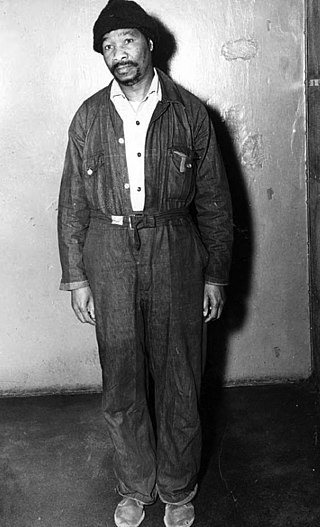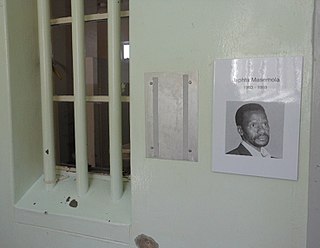Related Research Articles

Robben Island is an island in Table Bay, 6.9 kilometres (4.3 mi) west of the coast of Bloubergstrand, north of Cape Town, South Africa. It takes its name from the Dutch word for seals (robben), hence the Dutch/Afrikaans name Robbeneiland, which translates to Seal(s) Island.

Walter Max Ulyate Sisulu was a South African anti-apartheid activist and member of the African National Congress (ANC). Between terms as ANC Secretary-General (1949–1954) and ANC Deputy President (1991–1994), he was Accused No.2 in the Rivonia Trial and was incarcerated on Robben Island where he served more than 25 years' imprisonment for his anti-Apartheid revolutionary activism. He had a close partnership with Oliver Tambo and Nelson Mandela, with whom he played a key role in organising the 1952 Defiance Campaign and the establishment of the ANC Youth League and Umkhonto we Sizwe. He was also on the Central Committee of the South African Communist Party.

Albertina SisuluOMSG was a South African anti-apartheid activist. A member of the African National Congress (ANC), she was the founding co-president of the United Democratic Front. In South Africa, where she was affectionately known as Ma Sisulu, she is often called a mother of the nation.

The Rivonia Trial was a trial that took place in apartheid-era South Africa between 9 October 1963 and 12 June 1964, after a group of anti-apartheid activists were arrested on Liliesleaf Farm in Rivonia. The farm had been the secret location for meetings of uMkhonto we Sizwe (MK), the newly-formed armed wing of the African National Congress. The trial took place in Pretoria at the Palace of Justice and the Old Synagogue and led to the imprisonment of Nelson Mandela, Walter Sisulu, Govan Mbeki, Ahmed Kathrada, Denis Goldberg, Raymond Mhlaba, Elias Motsoaledi, Andrew Mlangeni. Many were convicted of sabotage and sentenced to life.

Govan Archibald Mvunyelwa Mbeki was a South African politician, military commander, Communist leader who served as the Secretary of Umkhonto we Sizwe, at its inception in 1961. He was also the son of Chief Sikelewu Mbeki and Johanna Mahala and also the father of the former South African president Thabo Mbeki and political economist Moeletsi Mbeki. He was a leader of the South African Communist Party and the African National Congress. After the Rivonia Trial, he was imprisoned (1963–1987) on charges of terrorism and treason, together with Nelson Mandela, Walter Sisulu, Raymond Mhlaba, Ahmed Kathrada and other eminent ANC leaders, for their role in the ANC's armed wing, Umkhonto we Sizwe (MK). He was sometimes mentioned by his nickname "Oom Gov".
Raymond Mphakamisi Mhlaba OMSG was an anti-apartheid activist, Communist and leader of the African National Congress (ANC) also as well the first premier of the Eastern Cape. Mhlaba spent 25 years of his life in prison. Well known for being sentenced, along with Nelson Mandela, Govan Mbeki, Walter Sisulu and others in the Rivonia Trial, he was an active member of the ANC and the South African Communist Party (SACP) all his adult life. His kindly manner brought him the nickname "Oom Ray".

Helen Suzman, OMSG, DBE was a South African anti-apartheid activist and politician. She represented a series of liberal and centre-left opposition parties during her 36-year tenure in the whites-only, National Party-controlled House of Assembly of South Africa at the height of apartheid.

Ahmed Mohamed Kathrada OMSG, sometimes known by the nickname "Kathy", was a South African politician and anti-apartheid activist.
Pollsmoor Prison, officially known as Pollsmoor Maximum Security Prison, is located in the Cape Town suburb of Tokai in South Africa. Pollsmoor is a maximum security penal facility that continues to hold some of South Africa's most dangerous criminals. Although the prison was designed with a maximum capacity of 4,336 offenders attended by a staff of 1,278, the current inmate population is over 7,000.
Herman Andimba Toivo ya Toivo was a Namibian anti-apartheid activist, politician and political prisoner. Ya Toivo was active in the pre-independence movement, and is one of the co-founders of the South West African People's Organisation (SWAPO) in 1960, and before that, its predecessor the Ovamboland People's Organization (OPO) in 1959.

Sathyandranath Ragunanan "Mac" Maharaj OLS is a retired South African politician, businessman, and former anti-apartheid activist. A member of the African National Congress (ANC), he was the first post-apartheid Minister of Transport from 1994 to 1999. He was later the official spokesperson to the President of South Africa, Jacob Zuma.

Goodbye Bafana, or The Color of Freedom (US), is a 2007 drama film, directed by Bille August, about the relationship between Nelson Mandela and James Gregory, his censor officer and prison guard, based on Gregory's book Goodbye Bafana: Nelson Mandela, My Prisoner, My Friend. The film also explores the relationship of James Gregory and his wife as their life changes while Mandela is under Gregory's watch.
The African Resistance Movement (ARM) was a militant anti-apartheid resistance movement, which operated in South Africa during the early and mid-1960s. It was founded in 1960, as the National Committee of Liberation (NCL), by members of South Africa's Liberal Party, which advocated the dismantling of apartheid and gradually transforming South Africa into a free multiracial society. It was renamed "African Resistance Movement" in 1964.
The Little Rivonia Trial was a South African apartheid-era court case in which several members of the armed resistance organization Umkhonto we Sizwe faced charges of sabotage. The accused were: Laloo Chiba, Dave Kitson, Mac Maharaj, John Matthews and Wilton Mkwayi. A confederate of theirs, Lionel Gay turned state witness, and in return, the prosecution dropped the charges against him.

Nelson Rolihlahla Mandela was a South African anti-apartheid activist and politician who served as the first president of South Africa from 1994 to 1999. He was the country's first black head of state and the first elected in a fully representative democratic election. His government focused on dismantling the legacy of apartheid by fostering racial reconciliation. Ideologically an African nationalist and socialist, he served as the president of the African National Congress (ANC) party from 1991 to 1997.

Dikgang Ernest Moseneke OLG is a South African jurist and former Deputy Chief Justice of South Africa.

Wilton Zimasile Mkwayi OMSG was an African National Congress veteran and one of the first six members of Umkonto weSizwe to be sent for military training.

Jafta Kgalabi Masemola OLS, also known as The Tiger of Azania and Bra Jeff, was a South African anti-apartheid activist, teacher, and founder of the armed wing of the Pan Africanist Congress (PAC). He is the only person to spend 27 years in South African prison [Robben Island] during the apartheid era in South Africa, and was released in October 1989, shortly before the legalization of the PAC and the African National Congress by F. W. de Klerk. He served the longest sentence of any political prisoner in Robben Island prison in South Africa.

Robben Island Prison is an inactive prison on Robben Island in Table Bay, 6.9 kilometers (4.3 mi) west of the coast of Bloubergstrand, Cape Town, South Africa. Nobel Laureate and former President of South Africa Nelson Mandela was imprisoned there for 18 of the 27 years he served behind bars before the fall of apartheid. Since then, three former inmates of the prison have gone on to become President of South Africa.
Sonny Venkatrathnam was a South African anti-apartheid activist and human rights activist who was imprisoned in the Robben Island Maximum Security Prison along with other anti-apartheid activists including Nelson Mandela, Govan Mbeki, and Mac Maharaj. He was most famously known for smuggling an edition of The Complete Works of William Shakespeare into the prison. The book was shared with many of the high-profile prisoners in the prison and was called the Robben Island Bible.
References
- ↑ http://www.cvet.org.za/displayvideo.php?vid=2D-F5-51 Archived 22 July 2015 at the Wayback Machine CVET interview video
- ↑ Daniels 1998, Ch. 1.
- ↑ Daniels 1998, Ch. 3 & 4.
- ↑ Daniels 1998, Ch. 6.
- ↑ Daniels 1998, Ch. 3.
- ↑ Daniels 1998, p. 93.
- ↑ Daniels 1998, Ch. 16.
- ↑ Daniels 1998, Ch. 9.
- ↑ "Eddie Daniels", South African History Online.
- ↑ "Author, anti-apartheid activist Eddie Daniels to speak Oct. 24" Archived 12 November 2013 at the Wayback Machine , College of Arts and Letters, University of Notre Dame, 16 October 2006
- ↑ "BGSU :: Marketing & Communications :: Eddie Daniels". www.bgsu.edu. Archived from the original on 14 June 2007.
- ↑ "Edward 'Eddie' John Daniels | South African History Online".